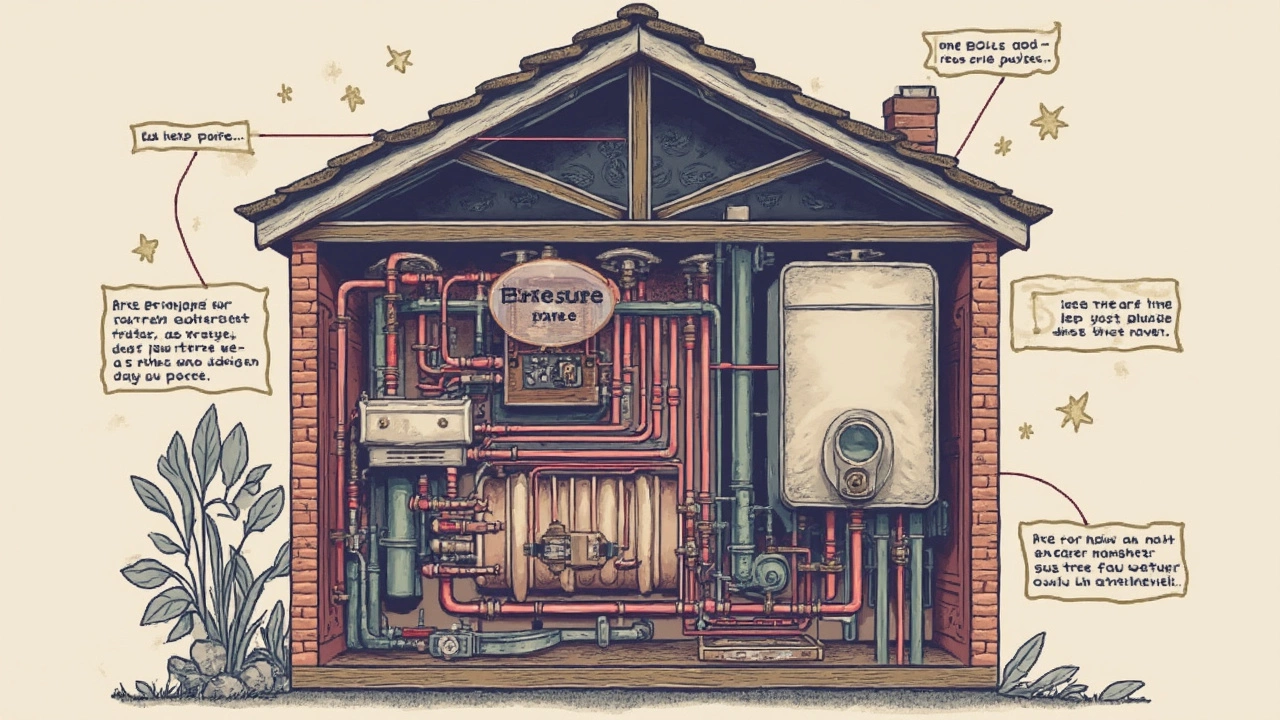Keeping your boiler in tip-top shape isn’t just about maintaining coziness during those chilly nights—it’s a serious money-saver, too. You might be surprised to learn what's involved in a boiler service and why it's so crucial for your home. Ever wondered what those technicians actually do when they come over for a service?
A boiler service is a bit like a doctor’s check-up for your heating system. Whether it’s keeping an eye out for hidden leaks or tuning up the pressure levels, these inspections catch the little issues before they turn into big, expensive problems. And hey, if your boiler is running more efficiently, your energy bills might just drop too!
Now, you might be thinking, 'How often should I be doing this?' Professionals suggest an annual service, especially ahead of winter. But don't just take my word for it—let's dig deeper into why regular servicing is a smart move.
- Reasons for Regular Boiler Servicing
- Key Tasks in a Boiler Service
- Signs Your Boiler Needs a Service
- DIY Tips for Boiler Maintenance
- Choosing the Right Professional
Reasons for Regular Boiler Servicing
Getting your boiler service done regularly is like putting money in the bank for a rainy day. Here’s why it should be on your annual to-do list.
1. Enhances Efficiency
A well-maintained boiler runs smoother and wastes less energy. This means not only a cozy home but also potentially lower energy bills. When you keep your heating system in top shape, it doesn’t have to work as hard, saving you money in the long run.
2. Prevents Breakdowns
No one likes those mid-winter surprises where your boiler suddenly decides to take a break. Regular servicing can catch early signs of wear and tear. Most of us are not boiler experts, so why not let a professional have a look?
3. Safety First
A faulty boiler can lead to carbon monoxide leaks, which are not only dangerous but potentially deadly. Regular checks ensure all components are functioning safely, and there are no leaks, safeguarding your family’s health.
4. Extends Boiler's Lifespan
Your boiler is a big investment, and regular care can extend its lifespan. Servicing identifies issues before they escalate, meaning fewer expensive repairs and replacements.
5. Compliance with Warranty
Did you know that skipping a boiler service could void your warranty? Most manufacturers require annual servicing for the warranty to remain valid. So, it’s not just about maintenance—it’s about keeping your coverage intact.
It’s clear that these services are not a luxury but a necessity. Evaluating your budget for regular checks might seem like a bother, but considering the potential cost savings and peace of mind, it’s a no-brainer. Next time you’re tempted to put it off, think about the bigger picture—and call in the experts.
Key Tasks in a Boiler Service
Wondering what exactly happens when a technician comes to perform a boiler service? It’s not just about making sure the boiler hums along without a hitch—there’s a detailed checklist they follow to ensure everything’s in order and safe. Here’s a breakdown of the nitty-gritty tasks involved.
Visual Inspection
First off, technicians begin with a visual inspection of the boiler. This includes checking the exterior for signs of damage, wear and tear, and any obvious leaks. They also make sure there's adequate ventilation around the boiler—an often overlooked element crucial for safety.
Checking the Boiler Controls
Next, they get hands-on with the boiler controls. This means firing up the boiler to ensure everything operates smoothly. The technician will adjust temperature settings and controls, making sure you’re not in for any surprises later on.
Gas and Pressure Levels
Your technician will measure gas and pressure levels to ensure they’re balanced right. Low pressure might leave your home a bit too chilly, while high pressure could cause stress on the system.
Component Efficiency
The internal components, like the heat exchanger, burner, and spark probe, get a thorough check-up. Your technician cleans parts as necessary, stripping out debris that might hinder performance.
Flue Pipe Testing
Inspecting the flue pipe ensures it's not blocked or leaking. These pipes are vital for carrying away harmful gases produced during the heating process. Test readings are done to ensure these gases are being expelled properly and safely.
| Task | Importance |
|---|---|
| Visual Inspection | Identifies obvious physical damage |
| Boiler Controls | Ensures operational settings are correct |
| Gas and Pressure Levels | Prevents underheating and overpressure |
| Component Efficiency | Maintains performance and extends lifespan |
| Flue Pipe Testing | Ensures safe expulsion of gases |
Regularly having a boiler service isn’t just about fixing problems; it's about catching them before they start. Remember, keeping up with these services can save you heaps in unexpected repairs and keep your house warm when it matters most.

Signs Your Boiler Needs a Service
Not sure if your boiler is due for a check-up? There are a few telltale signs that something might be amiss. Ignoring these clues can lead to bigger headaches down the road, so it’s worth keeping an eye out.
1. Unusual Noises
Boilers aren’t supposed to make strange clunking or banging noises. If your heating system sounds like it's having a dance party, that’s a red flag. These noises can mean a variety of issues, from air in the system to low water pressure.
2. Inconsistent Heating
Finding some parts of your house warmer than others? Or maybe the hot water isn’t so hot anymore? Inconsistent heating is a big indicator that something’s up and it might be time for a boiler service.
3. Boiler Turns Off
A boiler that frequently shuts itself off isn’t just annoying. It’s often a sign that there’s a bigger problem that needs addressing, like thermostat issues or a blockage somewhere in the system.
4. Unexpected Rise in Energy Bills
Notice your energy bills going up for no reason? It could be because your boiler isn't running efficiently. Regular servicing helps maintain efficiency, keeping costs down.
5. Yellow Flame
Your boiler’s pilot light should be blue. A yellow or orange flame might mean a carbon monoxide leak, which is extremely dangerous. If you spot this, don’t wait—get a professional in immediately.
6. Leaks
Nobody likes dealing with water leaks, especially from a boiler. This is a definite sign that you need a boiler repair or service. Check for any puddles around your boiler regularly.
A little attention now can save you from massive problems later. If you’ve checked off any of these signs, it’s wise to call a specialist and get it sorted sooner rather than later.
DIY Tips for Boiler Maintenance
Feeling adventurous enough to tackle some basic boiler maintenance yourself? While I'd always suggest leaving the complex stuff to a pro, there are simple tasks you can handle to keep your boiler running smoothly. It's all about preventing those surprise breakdowns!
1. Keep an Eye on the Pressure
Your boiler's pressure gauge is like a speedometer—except it shows pressure levels. Too low or too high can spell trouble. Ideally, you want it around 1 to 1.5 bars. If it's off, consult the manual on how to adjust it safely.
2. Bleed Your Radiators
If you notice your radiators aren’t heating evenly, it might be time for a little bleed. Air trapped inside can mess with efficiency. Use a radiator key, household towel, and a bit of patience to release that trapped air.
3. Check the Pilot Light
No light, no heat! Make sure the pilot light is always on if your boiler system depends on it. Should it go out often, it could signal a bigger issue.
4. Clear the Surrounding Area
Clutter can mean trouble for boilers. Keep the area around your heating system clear from any objects to ensure proper ventilation. This one's an easy fix and often overlooked!
5. Listen for Unusual Sounds
If your boiler starts sounding like a dubstep track, something isn't right. Odd clunks and bangs need attention, possibly pointing to buildup inside the system.
6. Inspect for Leaks
Look around for any water pooling around your boiler. Noticing that? Shut off your system and call in a technician for a more thorough boiler repair.
These small actions can have a significant impact on your boiler’s performance. Remember, safe and snug is the way to go. If ever in doubt, your best bet is to call a professional to avoid making matters worse.

Choosing the Right Professional
Picking the right person to service your boiler can make all the difference in your heating system's performance. But with so many options out there, where do you even start?
Check Qualifications and Experience
First things first, you want someone who knows what they're doing. In New Zealand, look for someone who’s certified by the Plumbers, Gasfitters, and Drainlayers Board. They should have relevant experience in boiler repair and a good track record. It won’t hurt to ask about their specific experience with your boiler model, too.
Read Reviews and Ask for Recommendations
Word of mouth is powerful. Ask around—friends, family, even neighbors who have similar heating systems. Online reviews can also shed light on what to expect. Look for consistent themes in feedback to gauge reliability and customer satisfaction.
Get Quotes and Compare
Don’t just settle for the first professional you find. Get multiple quotes—between 3 to 5 is a good target. But be wary of prices that are too good to be true. The cost of a boiler service usually reflects the quality of the work. Remember, you get what you pay for!
Verify Insurance and Guarantee
A reputable technician will have insurance coverage, which protects both them and you. Also, check if they offer any kind of guarantee on their work. This can be crucial if any issues arise after servicing.
Finally, trust your gut. Communication is key, so go with someone who answers your questions clearly and makes you feel comfortable. After all, you're inviting them into your home and trusting them with something pretty essential!
